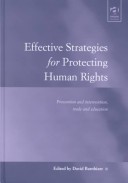Law, Justice and Power
1 total work
The second volume of this work concentrates on strategies for increasing our ability to monitor and investigate, and to force human rights concerns into the rules of the trading regime that is trumping humanistic concerns. Including contributions from representatives of all facets of the human rights community, the book also offers a probing examination of the strategies for educating different constituencies to behave in a more humane way. Issues considered include monitoring and investigation of human rights violations, protection of journalists and human rights workers, the role and limits of the various human rights conventions, and the use of information and communication technologies to improve human rights monitoring, enforcement and prosecution. The work considers at some length the factors involved in balancing the inherent conflict between trade, human rights, and the environment. In considering educational strategies, the focus is on women, community education in human rights and the special challenge involved in educating the military and police to respect human rights.
